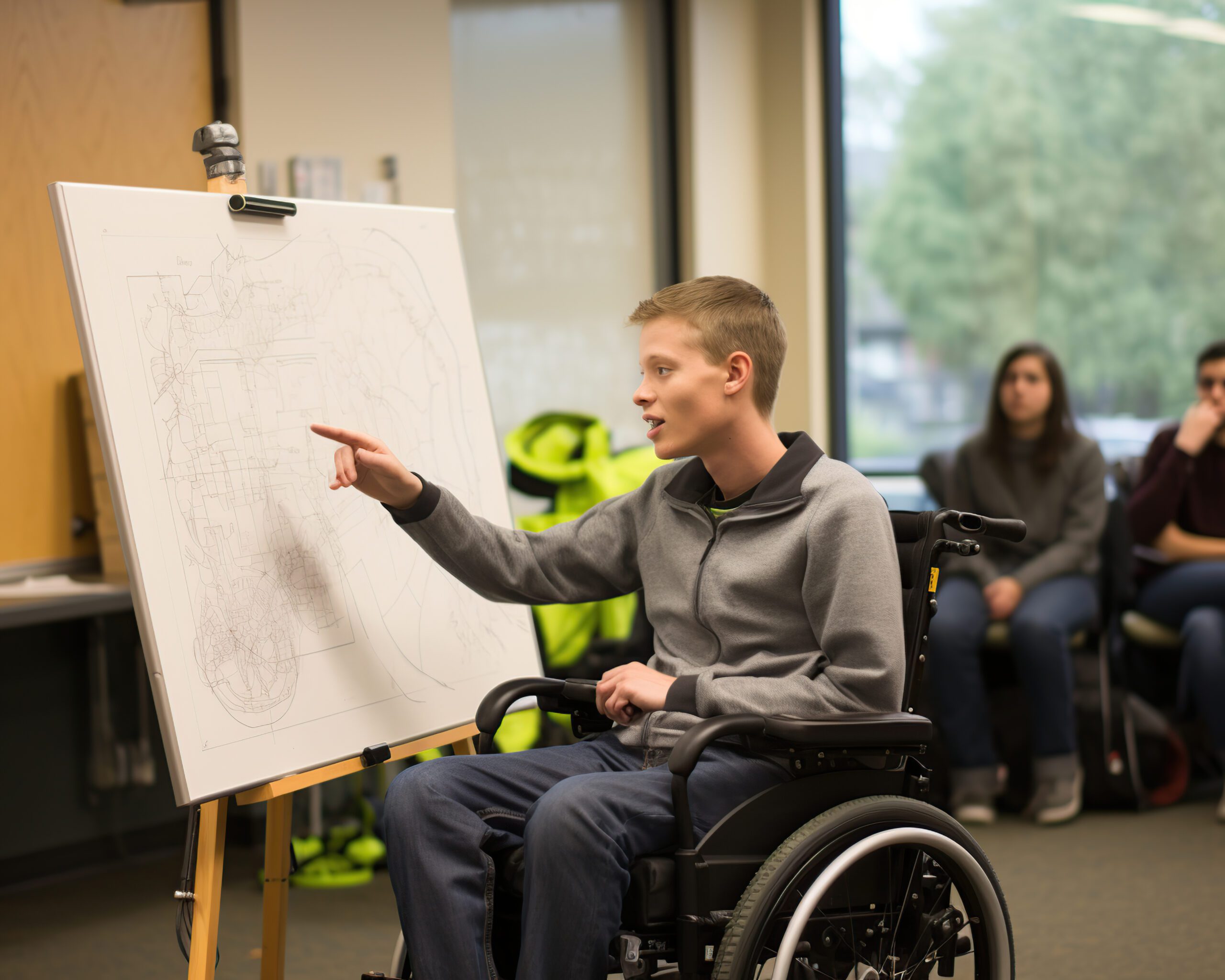As the demand for disability support workers in Australia increases, with the correct skills, knowledge and desire, you can make a significant difference in the lives of the disabled population while earning a steady income and working in a meaningful job.
The disability support industry provides rich job opportunities that can be both rewarding and fulfilling. Whether you are looking for a career change or are just starting out in the workforce, a career as a disability support worker could be the perfect fit for you.
In this article, we will explore various aspects of disability support workers and examine the earning potential of this profession.
Who is Disability Support Worker?
A Disability Support Worker is a specialist who serves persons with disabilities, both physical and mental, who are impacted by their surroundings along with personal factors in their daily life. They collaborate closely with their clients, cultivating relationships and establishing a supportive environment in which clients can enhance their quality of life. Australia has adopted the National Disability Insurance Scheme (NDIS), which has led to increasing demand for Disability Support Workers and the need for greater workforce capacity.
Responsibilities of a Disability Support Worker (DSW)
A Disability Support Worker (DSW) carries responsibilities for offering ongoing support to people with difficulties in achieving their goals and living as independently as feasible. You need to note that the specific responsibilities of a disability support worker may vary depending on the needs of the individuals they support and the setting in which they work. However, here are a few common disability support worker jobs listed.
- Providing personal care: A DSW is responsible for aiding individuals with disabilities with personal care tasks such as washing, dressing, toileting and grooming.
- Providing emotional support: Individuals with disabilities may require the emotional support of a DSW, and the job includes focusing on their wellbeing, listening to their concerns, providing reassurance, and supporting them in managing their emotions.
- Assisting with medication: A DSW may be in charge of providing medication to people with difficulties in accordance with their care plan and under the supervision of a healthcare expert.
- Supporting daily living tasks: A DSW must support people living with a disability with daily activities such as cooking, cleaning, grocery shopping, and running errands.
- Developing and implementing care plans: A DSW works with individuals with disabilities and their families to create and implement care plans tailored to their specific needs and aspirations.
- Monitoring progress: A DSW is often tasked with monitoring the progress of people with impairments and reporting any changes or concerns to healthcare providers.
- Providing transportation: A DSW is occasionally required to transport individuals with disabilities to appointments, recreational activities, or events.
- Advocating for individuals with disabilities: A DSW is permitted to stand up for individuals with disabilities rights and needs, ensuring that they are treated with respect and dignity.
- Ensuring a safe environment: A DSW is usually in the position of ensuring a safe environment for individuals with disabilities, which includes detecting and addressing any safety concerns.
- Maintaining records: In compliance with legal and organisational standards, a DSW’s duty is to keep accurate and up-to-date records of the care and assistance provided to individuals with disabilities.
Credentials for Disability Support Workers (DSW)
Businesses may prefer to engage DSWs who have finished appropriate education and training programs, such as a certificate or diploma program in disability support, healthcare, or social services. As a DSW in Australia, you must have a Certificate III in Individual Support or Certificate IV in Disability or an equivalent certificate to fulfill the qualification as a disability care provider. These courses often address subject matters such as providing person-centred support, dealing with legal and ethical frameworks, and aiding with personal care, mobility, and communication.
While credentials may demonstrate core knowledge and skills, it is not a substitute for experience and compassionate treatment. Credentials and work experience can help you develop your professions, learn new skills and information and demonstrate your expertise to potential employers. In addition, as a DSW, you must be committed to providing high-quality support services for clients and empowering and supporting people with disabilities to live better lives.
Explore: Top Career Pathways within Certificate III in Individual Support
Job Outlook for Disability Support Worker (DSW)
Depending on factors like location, population demographics and Australian government funding for disability services, your job outlook can vary. Demand for DSWs is expected to expand as the number of Australians with disabilities increases and the population ages. It is a rewarding career that allows you to serve people and contribute to their general well-being. As stated by Aihw.gov.au, it is estimated that 18% of the population has a disability, while 32% of those individuals require assistance for daily activities due to severe or profound impairment. As a result, the income potential of working as a DSW grows.
As a DSW, you will be able to work in an array of residential and community settings), such as:
- Nursing and hospital facilities
- Social assistance sector
- Private homes
- Care centred around communities
- Age care facilities
- Elderly residential care homes
- Organisations that provide community service
- Medical centres
- Administrative support service
- Retirement homes
- NGOs
As a DSW, you can get employed by several organisations and have a gratifying profession that allows you to help individuals with disabilities live dignified and productive lives. By working in this field, you will get opportunities to support coordination with the National Disability Scheme (NDIS) for qualified clients and oversee the process of onboarding new customers.
Unlock Your Future in Business and Healthcare Today!
Salary Insight for Disability Support Workers (DSW) in Australia
Disability Support Worker salaries estimates may differ depending on location, experience level, qualifications, and one’s role in disability support work. According to talent.com national average salary for an Australian DSW is reported to be around $35.69 per hour and $67,265 per year in 2023.
You can expect wages to be $61,008 annually at Entry-level positions, while most experienced workers get paid $86,657 annually in this sector. If an organisation hires you on a casual basis, as per Employsure.com, you get 25% casual loading which indicates you will receive an additional 25% on top of your usual pay rate.
Most companies associated with disability support worker jobs offer annual bonuses, appealing shift patterns (morning, afternoon, and night duty), part-time or full-time, comprehensive insurance, as well as opportunities for ongoing education and career growth.
Perks of Being a Disability Support Worker (DSW)
Working as a DSW can be an exciting and unique career path. One of the primary benefits of working as a DSW is the ability to positively touch the lives of those with disabilities and their families. You can learn valuable communication, problem-solving, and teamwork skills, as well as gain knowledge in areas like assistive technology and behaviour management. Because of the great demand, you will have excellent job stability and prospects for promotion.
FAQ’s
What are the challenges faced by a disability support worker (DSW)?
DSWs face various job challenges, such as dealing with challenging behaviours, providing person-centred care, managing workload and time, maintaining work-life balance, communicating difficulties, managing and responding to emergencies, and staying current on training and professional development. Addressing these issues is critical to ensuring DSWs can provide effective and compassionate assistance to individuals with disabilities.
Are disability support workers and aged care workers the same?
While Disability Support (DSWs) and Aged Care Workers (ACWs) have some similarities, they differ. DSWs lend a hand to individuals with disabilities, whereas ACWs encourage and help older people who require care due to aging or sickness.
How to build a successful career in Disability Support Work?
To begin, it is critical to earn the necessary credentials by finishing a certificate or diploma in disability support or a related subject. It is also critical to gain experience and build your talents through volunteering, internships, or part-time jobs. Staying up to date on the newest improvements in disability support, as well as seeking help from colleagues, will help you advance your career.
Questions asked to the disability support workers during the interview?
To assess the candidate’s skills, experience, and aptitude for the post, the interviewer may ask various questions, such as their experience dealing with an individual with disabilities, their understanding of person-centered care, their approach to addressing challenging behaviours, and various other topics.
Get started on providing support as a care worker!
Are you ready to excel in your career as a disability support worker making a positive impact on someone’s life? Bright College has your back, offering an exceptional disability course that leads to higher employment and increases earning potential.
Hands-on training and strong community partnerships allow you to explore various job opportunities that align with your interests and goals. Get enrolled now to feel confident in your ability to make a difference in the lives of others while achieving personal and professional success.
Do not miss this incredible opportunity – reach out to us today to learn more about our courses and start your journey towards success.




